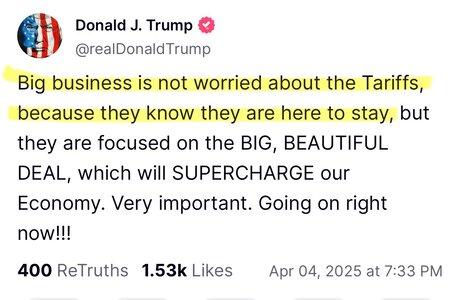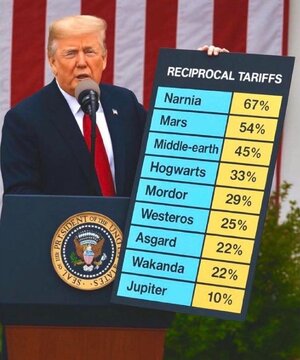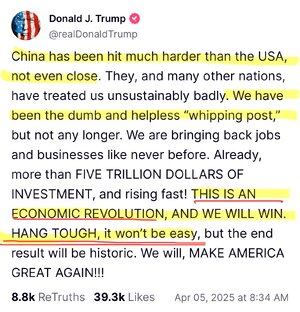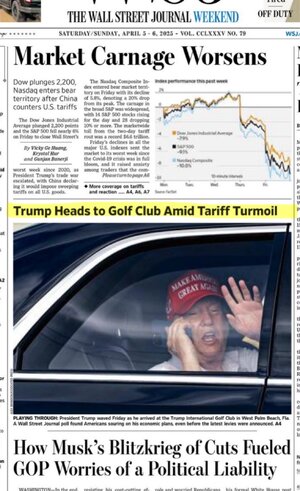Navigation
Install the app
How to install the app on iOS
Follow along with the video below to see how to install our site as a web app on your home screen.
Note: This feature may not be available in some browsers.
More options
You are using an out of date browser. It may not display this or other websites correctly.
You should upgrade or use an alternative browser.
You should upgrade or use an alternative browser.
Tariffs Catch-All
- Thread starter BubbaOtis
- Start date
- Replies: 5K
- Views: 172K
- Politics
- Messages
- 39,345
- Messages
- 963
“…Trump personally selected a formulathat was based on two simple variables — the trade deficit with each country and the total value of its U.S. exports, said two of the people, who spoke on the condition of anonymity to recount internal talks.
While precisely who proposed that option remains unclear, it bears some striking similarities to a methodology published during Trump’s first administration by Peter Navarro, now the president’s hard-charging economic adviser.
After its debut in the Rose Garden on Wednesday, the crude math drew mockery from economists as Trump’s new global trade war prompted a sharp drop in markets.
… After deliberations that went late into Tuesday, Trump didn’t decide on the final plan until about 1 p.m. Wednesday — less than three hours ahead of his Rose Garden announcement.
… “He’s at the peak of just not giving a f--- anymore,” said a White House official with knowledge of Trump’s thinking.
“Bad news stories? Doesn’t give a f---. He’s going to do what he’s going to do. He’s going to do what he promised to do on the campaign trail.” …”
This is what we’re dealing with:
“He’s at the peak of just not giving a f--- anymore,” said a White House official with knowledge of Trump’s thinking.
“Bad news stories? Doesn’t give a f---. He’s going to do what he’s going to do. He’s going to do what he promised to do on the campaign trail.”
Silence Dogood
Esteemed Member
- Messages
- 645
Pelosi: I'd like to call the attention of our colleagues to this chart on the status quo that the business community is asking each and every one of you— to each and every one of us to endorse today. Right now, we have a $34 billion trade deficit with China, the 1995 figure. It will be over $40 billion for 1996. Since the Tiananmen Square Massacre, this figure has increased 1,000%, from three and a half billion then, to about $34 billion now. In terms of tariffs, I think it's interesting to note that the average US MFN [Most Favored Nation] tariff on Chinese goods coming into the United States is 2%, whereas the average Chinese MFN tariff on US goods going into China is 35%. Is that reciprocal?
On exports, China only allows certain industries into China—of US industries into China, and therefore only 2% of US exports are allowed into China. On the other hand, the US allows China to flood our markets with a third of their exports, and that will probably go over 40%, and it's limitless because we have not placed any restriction. In terms of jobs, this is the biggest and cruelest hoax of all! Not only do we not have market access, not only do they have prohibitive tariffs, not only are our exports not let in very specifically, but China benefits with at least, at least 10 million jobs from US China trade.
lawtig02
Legend of ZZL
- Messages
- 5,754
Pelosi: I'd like to call the attention of our colleagues to this chart on the status quo that the business community is asking each and every one of you— to each and every one of us to endorse today. Right now, we have a $34 billion trade deficit with China, the 1995 figure. It will be over $40 billion for 1996. Since the Tiananmen Square Massacre, this figure has increased 1,000%, from three and a half billion then, to about $34 billion now. In terms of tariffs, I think it's interesting to note that the average US MFN [Most Favored Nation] tariff on Chinese goods coming into the United States is 2%, whereas the average Chinese MFN tariff on US goods going into China is 35%. Is that reciprocal?
On exports, China only allows certain industries into China—of US industries into China, and therefore only 2% of US exports are allowed into China. On the other hand, the US allows China to flood our markets with a third of their exports, and that will probably go over 40%, and it's limitless because we have not placed any restriction. In terms of jobs, this is the biggest and cruelest hoax of all! Not only do we not have market access, not only do they have prohibitive tariffs, not only are our exports not let in very specifically, but China benefits with at least, at least 10 million jobs from US China trade.
I know, right! Doesn’t that make you glad we were able to adequately addressed this issue in the last 30 years WITHOUT destroying the domestic and global economies?
- Messages
- 39,345
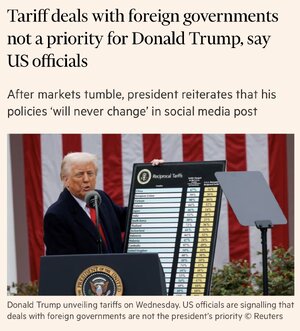
“… White House officials cautioned the president’s openness to “picking up the phone” to a foreign leader should not be confused for serious negotiations that would lead to tariffs being lowered.
… The White House was focused on implementing the levies, they added, suggesting Washington will set a high bar for any agreement to ease the measures. “President Trump is always willing to take a phone call from a foreign leader and discuss possible deals, but it is not a negotiation until it’s a negotiation,” said one White House official.
… “This is not a negotiation,” a senior White House official said on Wednesday. “It’s a national emergency.”
… One person familiar with the administration’s thinking said Trump understood that to lure companies into moving their manufacturing operations to the US, the tariffs would need to be permanent.
“Companies need certainty that this is the new policy environment,” the person said. The White House official said the US was not talking to other countries about “specific concessions”.
“The thing we are looking at is trade deficits,” they said. …”

Tariff deals with foreign governments not a priority for Donald Trump, say US officials
After markets tumble, president reiterates that his policies ‘will never change’ in social media post
- Messages
- 480
Notice that Trump didn't include the Death Star. Darth Vader is exactly the kind of strongman that Trump looks up to (exchanges love letters with).
Silence Dogood
Esteemed Member
- Messages
- 645
Same problems are occurringI know, right! Doesn’t that make you glad we were able to adequately addressed this issue in the last 30 years WITHOUT destroying the domestic and global economies?
lawtig02
Legend of ZZL
- Messages
- 5,754
You might want to double check that.Same problems are occurring
Okay, sheep.Trump raises tariffs it’s the worst thing ever, other countries do it it’s a non issue. TDS
superrific
Master of the ZZLverse
- Messages
- 11,953
Please explain the relationship between the capital account surplus and the current account deficit.Same problems are occurring
Please explain the relationship between the trade deficit and the federal government's deficit.
Please explain how blowing a hole in the federal government finances is going to help or hurt the trade
lawtig02
Legend of ZZL
- Messages
- 5,754
Not to mention, (1) what trade with China over the last 30 years has meant for US wealth, (2) what a more prosperous China means for global security, (3) the demographic challenges China is facing that will almost certainly keep the trade equation relatively stable (or tilted in our favor), and (4) the unaccounted-for services surplus we provide not just to China but to the entire world.Please explain the relationship between the capital account surplus and the current account deficit.
Please explain the relationship between the trade deficit and the federal government's deficit.
Please explain how blowing a hole in the federal government finances is going to help or hurt the trade
It’s almost like international trade is a more complicated topic than Silence is seeing on ZeroHedge.
- Messages
- 39,345
Republicans Grin and Bear It as Businesses Beg for Tariff Relief
Many GOP lawmakers say they trust Trump, but hope stock-market turbulence is short-lived
GIFT LINK
“… “When you see the stock market dropping 2,000 points in a couple of days, everybody gets grumpy.
But most people say, ‘I get it, long term this is going to be good,’ ” said Rep. Marlin Stutzman (R., Ind.), a beef cattle operator who is in favor of the tariffs. “There will be a turnaround. It’s just going to take some time.”
… Sen. Thom Tillis (R., N.C.) who also faces re-election in 2026, said he is hearing from constituents worried about tariff fallout. “Farmers are nervous, restaurant, lodging. But basically what you would expect,” Tillis said.
… By late Friday, with stocks in free fall, Tillis, Young and Collins had signed on to legislation that would allow Congress to remove tariffs with a simple majority vote.
The Trade Review Act, introduced Thursday by Sens. Maria Cantwell (D., Wash.) and Chuck Grassley (R., Iowa), now has a total of seven GOP co-sponsors. GOP Sens. Cruz, Mike Rounds of South Dakota and Rand Paul of Kentucky said they also are looking at potentially adding their names in support of the bill, which would need 60 votes to overcome the chamber’s filibuster threshold. Republicans have a 53-47 majority in the Senate.
Republican Rep. Don Bacon of Nebraska, who represents a swing district that Trump lost in 2024, plans to offer a companion measure in the House.“ …”
——
Trump would still have to sign it, so things would have to get so bad that you get enough votes to override a veto.
Duke Mu
Iconic Member
- Messages
- 1,942
The Billionaire Bros. were given a heads up and largely "cashed out" their investments...meaning moving to treasuries from equity...weeks or months ago. They lost very little. And are awaiting the massive Tax Breaks targeted at the billionaire class.Those guys had a net worth of around $2 trillion. I'm pretty sure they haven't lost any sleep over the past week .
They will rake in billions more than that in income and corporation tax cuts
- Messages
- 39,345
Someone needs to get footage of his $1 million/plate candlelight dinner this weekend. A la Romeny’s 47% fund raiser.
Duke Mu
Iconic Member
- Messages
- 1,942
So Trump admits a hit job on the American people. Nice.
Duke Mu
Iconic Member
- Messages
- 1,942
One of the goals of the global idiot tariffs could be good old fashioned grifting and emoluments. For example, Trump is probably looking for leverage, tax breaks, etc. on four "Hanoi HIlton" golf courses in Vietnam.
Trump golfs while the world burns - cover for more BANK ROBBERIES as Mike Johnson attempts to push massive tax cuts for billionaires, pretending the great wealth coming from tariff tax collection will be used to "pay" for the billionaire tax breaks. The dudes that parked their investment $$ months ago. Wink wink.
Trump golfs while the world burns - cover for more BANK ROBBERIES as Mike Johnson attempts to push massive tax cuts for billionaires, pretending the great wealth coming from tariff tax collection will be used to "pay" for the billionaire tax breaks. The dudes that parked their investment $$ months ago. Wink wink.
- Messages
- 39,345
When Huge Trump Tariffs Hit Small African Economies
The amount of manufactured goods exported from Africa to the United States is minuscule. But for Lesotho, the impact of a stunning 50 percent tariff is enormous.
When Huge Trump Tariffs Hit Small African Economies
The amount of manufactured goods exported from Africa to the United States is minuscule. But for Lesotho, the impact of a stunning 50 percent tariff is enormous.
“… Lesotho, which makes denim that goes into American-branded jeans, was hit with a 50 percent tariff. It was among several lower-income countries on the continent that were shocked by levies high above the minimum 10 percent imposed on nearly all of America’s trading partners.
Madagascar, where three-quarters of the population lives in poverty, now will be met with a 47 percent tariff when its apparel, vanilla and other exports enter the United States.
Products from Algeria, Angola, Botswana, Libya and Mauritius all now have tariffs above 30 percent, as does South Africa, which has come under particular attack by the Trump administration.
… But Lesotho is hardly a big player in global trade: It imported less than $3 million in goodsfrom the United States and exported $240 million there last year.
… But to countries like Lesotho, the impact of tariffs is enormous. Exports of denim and diamonds make up more than a tenth of the country’s gross domestic product.
… This will “devastate the economy,” said Jacques Nel, head of Africa Macro at Oxford Economics, a research firm. Lesotho is already a poor country. It has a population of two million and its entire national output is about $2 billion a year, with an annual per capita income of $975.
“This has nothing to do with actual tariffs,” Mr. Nel said. “They can’t import a lot from the U.S., because they don’t have a lot of money.” …”
- Messages
- 39,345
“… Lesotho’s factories have made garments — particularly denim — for manufacturers like Levi’s and Wrangler.When Huge Trump Tariffs Hit Small African Economies
The amount of manufactured goods exported from Africa to the United States is minuscule. But for Lesotho, the impact of a stunning 50 percent tariff is enormous.

When Huge Trump Tariffs Hit Small African Economies
The amount of manufactured goods exported from Africa to the United States is minuscule. But for Lesotho, the impact of a stunning 50 percent tariff is enormous.www.nytimes.com
“… Lesotho, which makes denim that goes into American-branded jeans, was hit with a 50 percent tariff. It was among several lower-income countries on the continent that were shocked by levies high above the minimum 10 percent imposed on nearly all of America’s trading partners.
Madagascar, where three-quarters of the population lives in poverty, now will be met with a 47 percent tariff when its apparel, vanilla and other exports enter the United States.
Products from Algeria, Angola, Botswana, Libya and Mauritius all now have tariffs above 30 percent, as does South Africa, which has come under particular attack by the Trump administration.
… But Lesotho is hardly a big player in global trade: It imported less than $3 million in goodsfrom the United States and exported $240 million there last year.
… But to countries like Lesotho, the impact of tariffs is enormous. Exports of denim and diamonds make up more than a tenth of the country’s gross domestic product.
… This will “devastate the economy,” said Jacques Nel, head of Africa Macro at Oxford Economics, a research firm. Lesotho is already a poor country. It has a population of two million and its entire national output is about $2 billion a year, with an annual per capita income of $975.
“This has nothing to do with actual tariffs,” Mr. Nel said. “They can’t import a lot from the U.S., because they don’t have a lot of money.” …”
And although Mr. Trump recently called Lesotho a country that “nobody has ever heard of,” his own Trump-branded Greg Norman golf shirts feature labels that say “Made in Lesotho.”**
Lesotho’s trade minister, Mokhethi Shelile, said the country has 11 factories that employ 12,000 workers. Seventy percent of what they produce is exported to the United States.
“We are a small economy,” Mr. Shelile said. “We just have to speak to the U.S. administration because the tariff is not based on facts.” …”
——
** “… In his [SOTU] speech to Congress …, Mr. Trump railed against aid to Africa, saying the United States was spending millions to promote L.G.B.T.Q. issues “in the African nation of Lesotho, which nobody has ever heard of.”

Africa Received Billions in U.S. Aid. Here’s What It Will Lose.
The United States spent decades responding to conflicts and disease in Africa. The continent is now expected to be the hardest hit by the Trump administration’s aid cuts.
Share:

